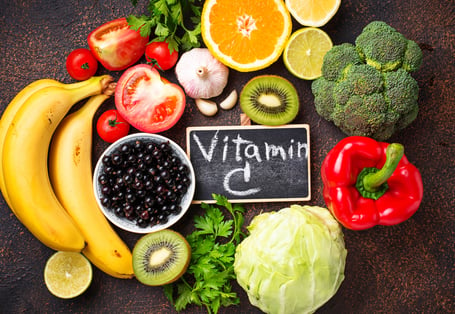 During cold and flu season, we try to do all we can to prevent illness or speed up how fast we recover from illness. One such strategy many employ is the use of Vitamin C for a natural remedy. Several products are marketed as immune system boosters because they contain large amounts of Vitamin C. Do these products really work? We set out to investigate!
During cold and flu season, we try to do all we can to prevent illness or speed up how fast we recover from illness. One such strategy many employ is the use of Vitamin C for a natural remedy. Several products are marketed as immune system boosters because they contain large amounts of Vitamin C. Do these products really work? We set out to investigate!
What Vitamin C Can Do for You
Vitamin C, also called ascorbic acid, is not made by our bodies. We must take in this vitamin in our diet. It is needed for not only immune function but also for these uses:
- Form collagen (skin, tendons, ligaments, and blood vessels),
- Repair and maintain bones and teeth
- Heal wounds and form scar tissue
- Aid in iron absorption
It can also help prevent cancer as an antioxidant by blocking damage that we are exposed to from air pollution, cigarettes, and UV rays from the sun.
Vitamin C deficiency is extremely rare today, but in the mid-1700s scurvy in sailors was very prevalent. Those at risk of low vitamin C intake are smokers, those with medical conditions that affect absorption (cancer cachexia), and individuals with little variety in their diets.
How Much Vitamin C Do You Need?
The recommended Dietary Allowance for men is 90 milligrams per day and 75 milligrams per day for women. Fruits and veggies are the best source of vitamin C—especially citrus fruits. It can be destroyed by heat, so cooking slightly reduces your intake. However, most of our best sources of vitamin C are consumed raw naturally, and we usually do not have to worry about this. To get a better idea of how to meet your daily requirement with food, here are the vitamin C contents of some common fruits and vegetables that are good sources:
- Red bell pepper (½ cup, raw): 95mg
- Orange, 1 medium: 70mg
- Green bell pepper, ½ cup raw: 60mg
- Broccoli, ½ cup cooked: 51mg
- Cantaloupe, ½ cup: 29mg
In short, you can skip the megadoses of Vitamin C at the pharmacy.
Can Vitamin C Treat or Prevent the Common Cold?
In the 1970s, research was released that suggested Vitamin C could successfully treat or prevent the common cold. Several studies since then have been inconsistent and have resulted in some confusion and controversy. To date, the most compelling evidence comes from a 2007 study that showed preventative treatment in the general population did not affect cold duration or symptom severity. However, in the trials involving marathon runners, skiers, and soldiers exposed to extreme physical exercise or cold environments daily as well as the elderly and smokers, there could be somewhat of a beneficial effect. It was concluded that taking Vitamin C after the onset of illness did not appear to be beneficial. Furthermore, at doses above 400mg, Vitamin C is excreted in the urine. A daily dose in the 1000–2000mg range can cause upset stomach and diarrhea.
If you want the benefits of Vitamin C, it is best to consume the recommended Dietary Allowance daily, before the start of symptoms. Ideally, you will get Vitamin C from your food instead of a supplement; you will also get several other important nutrients in addition to your Vitamin C. Remember to make half of your plate fruits and veggies at every meal or blend up a quick smoothie for an easy on-the-go snack, slice up peppers and dip in hummus, or ask for extra veggies on that sandwich, pizza, or salad.
This blog was written by Lindsey Hehman, MA, RD, CD. To learn more about the NIFS bloggers, click here.

